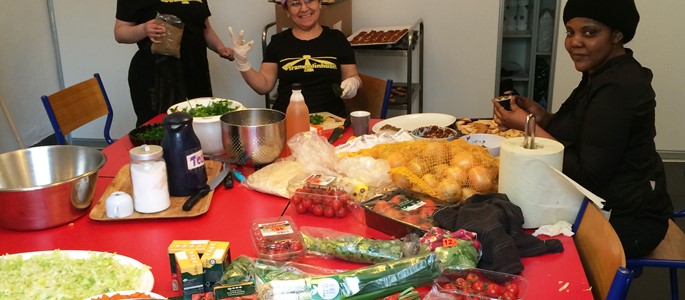Five serious tightenings for refugees on the way
Government proposals are all targeting the weakest
The five new tightenings have been presented as part of the yearly state budget negotiations. They are so far only proposals, not passed yet. One thing the five proposals have in common is that they will be hardest on the weakest refugees, and they send a signal that Denmark has only room for educated and self supporting people, whether they are in need of protection or not.
- The number of people receiving the new, low allowance "Integrationsydelse" will be extended.
- Requirements for permanent residence permit will be tougher.
- Change of criteria for resettlement refugees, so they will be chosen after "integration potential"
- Foreigners must pay for transport of their reunified family members to Denmark.
- The rules for family reunification will be tougher in general (will be presented in detail soon).
"Integration allowance" will be extended
Everybody who have not stayed in Denmark during seven out of the last eight years will be receiving Integrationsydelse in stead of the normal allowance Kontanthjælp (approximately half amount). Until now the low allowance has only targeted the ones who moved to their new municipality after September 1.
Read our Facts chapter about the new allowance here.
When the integration allowance was approved September 2015 it was met with hard criticism from European Council's Human Rights Commissioner, UNHCR, Danish Institute for Human Rights, Danish Refugee Council and Danish Red Cross. Professor and expert in asylum law Jens Vedsted-Hansen accused the government of violating article 23 in the Refugee Convention. This article says that refugees with legal stay in Denmark should have the the same support as Danish citizens. (Berlingske, Aug 11, 2015)
If the extention of the allowance will be approved, it will be effective from June 2016. It will include a much larger number of persons, namely everybody who has been here for less than seven years out of the last eight years. In 2016 22,000 will receive the lower allowance, and fully rolled out in 2017 it will be 38,000.
New requirements for permanent residence permit
- You must pass the exam of Dansk 2 in stead of Dansk 1 as now (read more about the Danish educations here)
- 50 percent longer penalty periods than today for criminal offenses.
- The requirement for full time job or education will be raised from the present 3 years out of 5 years to 2,5 years of the last 3 years.
- A new requirement to meet at least two out of the following four supplementary demands: Active society participation or passed society participation test, ordinary full time job during 4 out of the last 4,5 years, an average yearly income of 300,000 DKR during the last 2 years and a passed exam of Dansk 3.
- No dispensation for refugees.
Besides these new requirements there are still a number of requirements which will probably remain unchanged as they are. See them here.
During the VK government, hardly anybody got permanent residence permit because of the point system. In 2011 it was only 578 persons who got the permit. The requirements on language and self support were simply too hard for most people to meet. But when the STR government cancelled the point system and added an option for dispensation, the number rose quickly. In 2013 more than 4,000 people were granted permanent residence. In 2014 and first half of 2015 612 persons got the permit on dispensation grounds, this equals 10% of the granted permits (JP, July1. 2015).
These changes show that there is a limit that many can simply not cross. And this limit is especially hard for refugees. Many suffer from trauma and PTSD which makes learning a new language as well as handling a full time job very hard. The government thinks there should be no "short cuts" for refugees, and they seem to think it is only a question of will whether a person can meet the new requirements. We will also face problems with the UN Handicap Convention if we remove the access to dispensation for people with serious disabilities, either mental or physical.
As long as you don't have permanent residence permit, it is not possible to apply for family reunification (unless you are a refugee), you can loose your permit to stay any day if the original grounds for it are no longer there, and it is not possible to apply for citizenship.
Photo: Women in Trampoline House, Copenhagen


